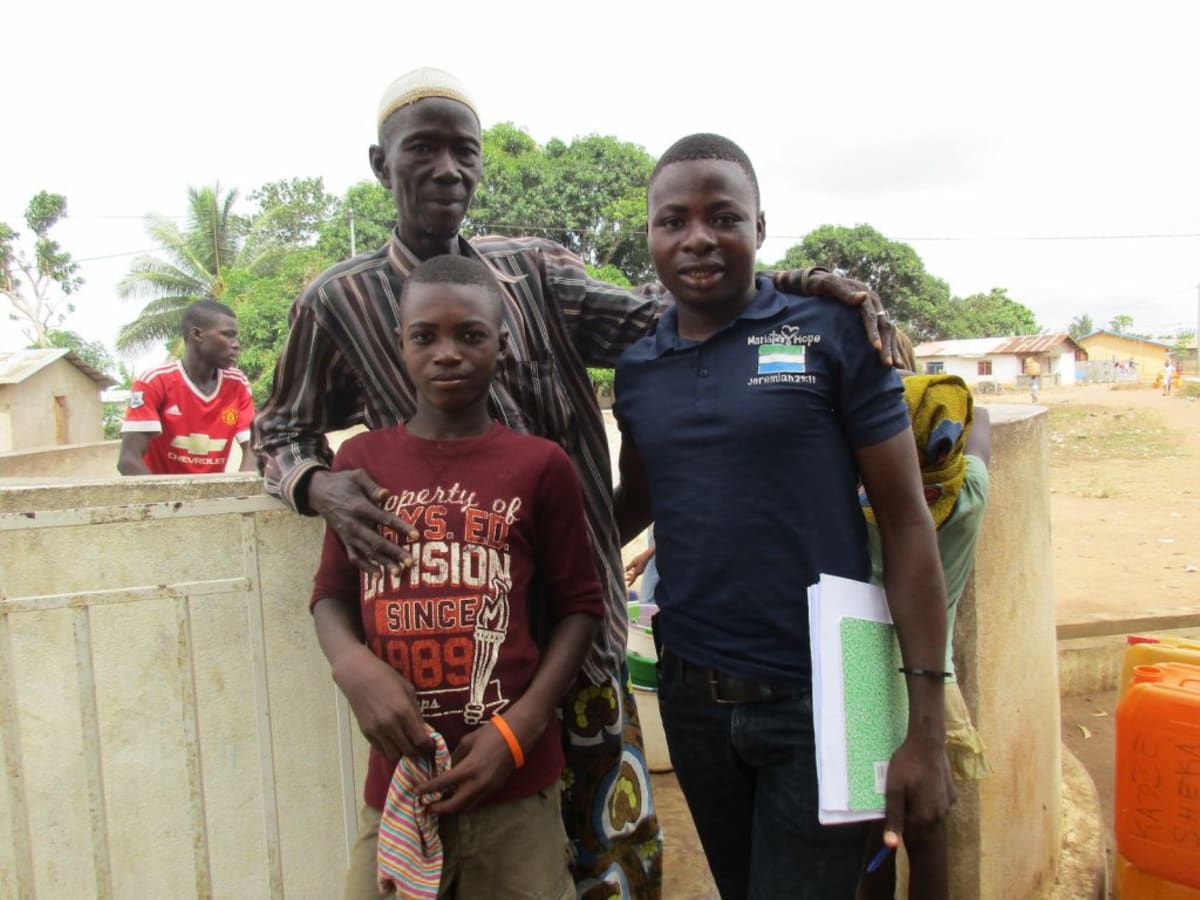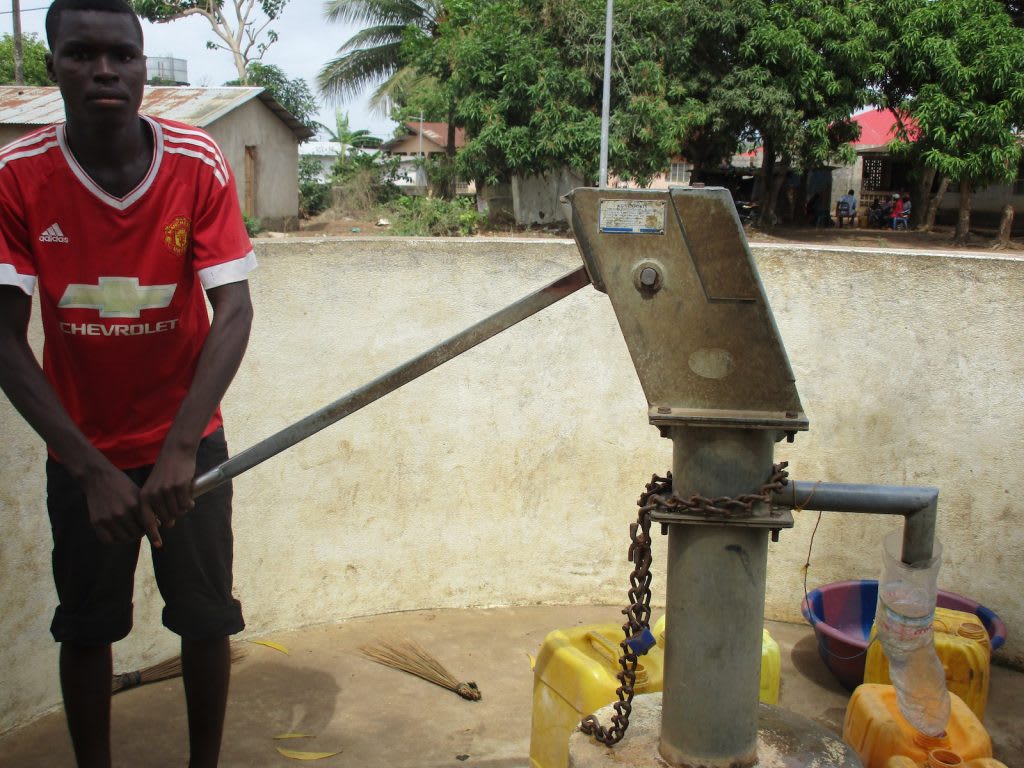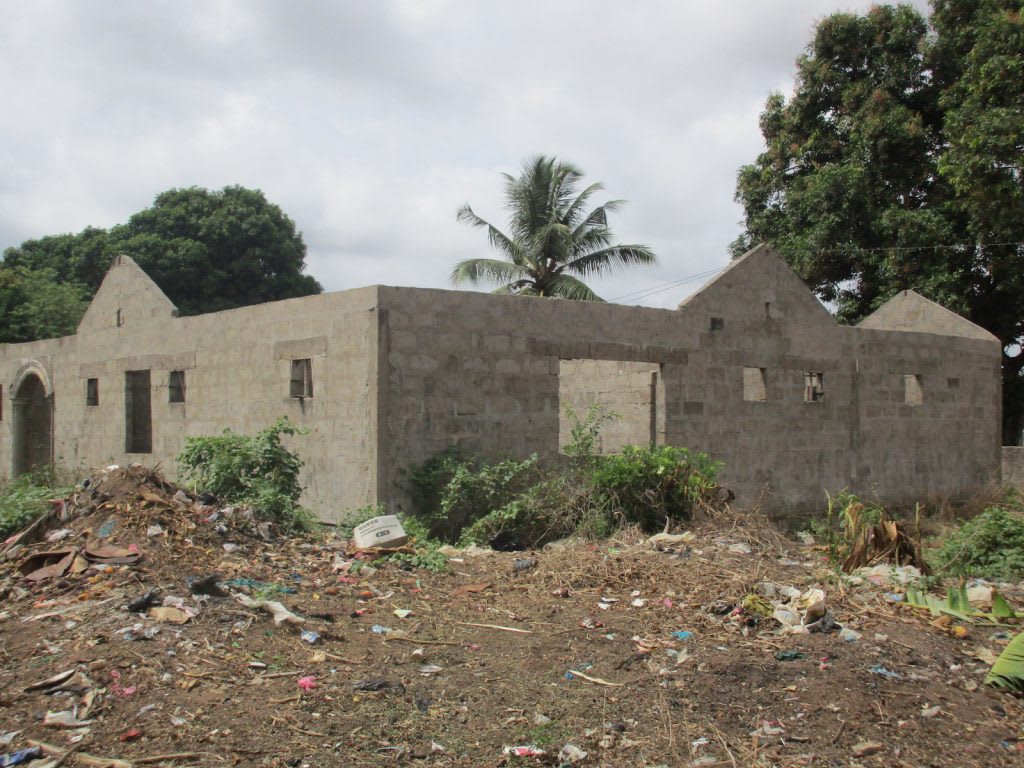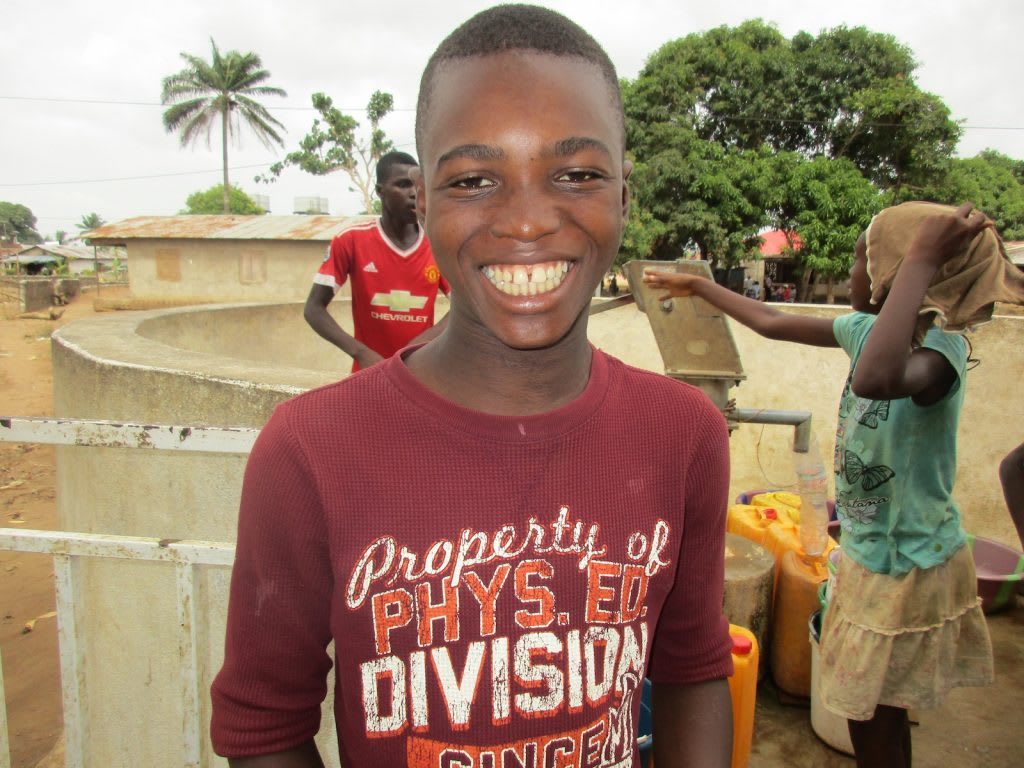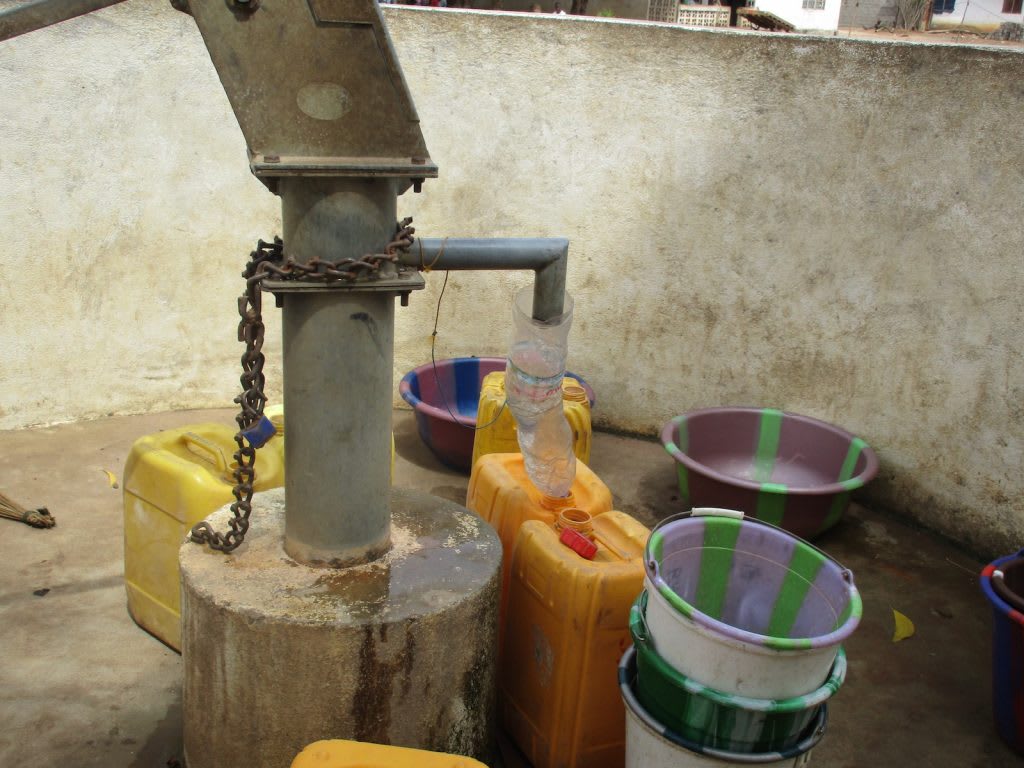Ebola’s Impact
Ebola has been a tragic reality for the people of Sierra Leone over the last two years. Though considered stable at the moment, the country is still very cautious. We still receive periodic reports of people being quarantined due to showing symptoms of Ebola.
Our teams have remained safe and are on the front lines of Ebola prevention through this water, hygiene and sanitation program. Your support acknowledges and celebrates their selfless work and bravery.
The entire team continues to express their gratitude for your support of communities in Sierra Leone, and we can’t wait to celebrate safe water together!
Background Information
This community is special because it is close to Rotifunk Junction, which is the hub of Lungi. There is a petrol station there. It is close to the market. There is a motor garage close by. There are many cookeries around. There are many primary and secondary schools nearby. There are also churches and mosques very close by.
The community is filled with petty traders, fitters/mechanics, carpenters, traders, office workers, airport workers, and teachers.
A typical day here is far from normal. Children get up at 5 a.m. to fetch water, wash dishes, and eat rice that is leftover from the night before that their mother has put on the fire for them. After eating breakfast, they wash and put on their school uniforms. They then help their mother carry her "market" (what she sells) to the market. If there is time, the children will help their mother pull things out of the sacks and help get them set up. After that, they get themselves to school.
If they are late, the teacher will cane them. This is normal, so they wear an extra pair of shorts under their other shorts if they are a boy, and if it's a girl they wear shorts under their skirts.
The mothers will return home around noon to begin to prepare food. They will have one of the other market women watch their store while they go home. The children will return home around 2:00 and wash their uniforms, and then will help prepare the food for their mothers to cook. Once food is cooked, the children will go to their extra school lessons while their moms return back to the market.
After lessons, the children will go to the market and help their moms break things down and then will return home to get washed and eat their dinner.
The day for a man begins by waking up and getting washed to go to prayer. There are five daily prayer times. Some men work, so after prayers, they go to their jobs. Many work places have a mosque or a place for Christians and Muslims to pray. Exercising their faith is very important to the people of Sierra Leone. Sierra Leone is a very religiously tolerant country.
After the man gets home from work, he will wash, eat, and then go to evening prayers.
Saturday is laundry day. The children will help their moms get to the market and then will come home to "brook" or launder their clothes. They will also help prepare the meal like during the week. On Sundays, everything is closed. People rise and go to Church if they are Christians and then return home to plait (braid) their daughter's hair and finish washing any clothes. The weekends is also a time for relaxing with family and friends.
Every day, families take time to pray together. If they are Muslims, they will go to the mosque. If they are Christians, they will gather as a family and pray and sing at home before heading to school or work.
Current Water Source
The community currently relies on packaged water and an unprotected well for water. The well is not far away, but is not a safe source a water. Since there is no hand pump, community members fetch water by dropping a bucket into the well with a rope. The well, which is open to the environment, is exposed to contamination from surface runoff, human and animal activity, proximate latrines, and improper waste disposal. Open defecation is also an issue in the community. The most obvious source of contamination is the bucket and rope used to fetch water from the well. When not being used, the bucket and rope sit exposed on the ground. It is not cleaned before being lowered back into the well. Unfortunately, because of separations in the casing of this well, it is not a viable candidate for rehabilitation.
Fetched water is then dumped in a waiting container, which could be a 5 gallon container, a bucket, or a big washing basin. Basically, people will carry water in whatever they can find. Sometimes the 5 gallon containers have covers, but the rest do not.
Water containers are washed with soap and water. Sometimes small stones are put inside and swished around to get the dirt off the inside. The outside of the containers are not always clean.
The gathered water is stored in a bucket with a cover. The bucket then may sit on a high table. If the family has young children, the bucket will be placed on a lower table where the children can easily fetch their own water. If they try to fetch it from off a higher table, they may turn the bucket over on themselves, getting soaked. Then they'll have to go and fetch more water.
Before consuming the water, some members of the community treat it by boiling, chlorine, or aquatabs. The most common, but least effective treatment is filtering the water with a piece of cotton. As a result of consuming water that has not been adequately treated, the community reports high instances of typhoid, dysentery, and vomiting.
A lead stakeholder in the community wrote a letter requesting assistance. The community seemed very active and they were ready to take on the extensive hygiene training and the transformation of the community that we were talking about.
When we went for the initial inspection of the community, the site where the well is to be drilled was really a mess. There was a person who was residing on the land next to the site and they pulled up and moved out leaving a huge mess behind them. There was trash blowing all over the place. We advised the community that we would be back on Monday. If the area was cleaned up, we would consider their request. We initially went there on a Thursday. When we went back on the following Monday, the area had been cleaned and the trash had been burned.
The community is willing to provide sand, food and some blocks if needed. They will also provide a place for the team to set up camp. The community members are also willing to bring their own one gallon containers to the hygiene training to construct tippy taps. They will also help with security.
There is a WaSH constitution which will be signed. We've also requested a copy of the land owners deed so we can type up an agreement for the generations to come that this must always remain a community well and that no security wall can ever be built around it to enclose it away from the community. The land owner was willing to do this. We are requesting good attendance at the hygiene trainings and good participation doing the practical.
Sanitation Situation
Over 75% of the households in the community have pit latrines, but less than 50% of the latrines are in good condition. They are primarily constructed out of mud blocks and the roofs are steel, tarp or rice bags and palm branches supported by sticks. They are not hygienic. Some are also being used for storage. For those people who do not have a latrine, they may be sharing a latrine with their neighbor.
Less than 25% of households have hand washing stations such as tippy-taps. Less than half of the households have important fixtures like dish-drying racks and clothes lines. However, over 75% have bathing rooms.
Trash in the community is disposed of by discarding it in a rubbish pit where it is eventually burned. Those who do not use a pit throw trash on the side of the road, where it is soaked by rain and blown around the community by the wind.
The overall attitude toward sanitation and hygiene in the community is negative, but it is changing. The majority of the community has and uses a pit latrine. There was a great attendance for the first hygiene training. On our initial community engagement with the community, we met with a small group of men and women in one of the areas behind the houses where the kitchen was. The house had no dish rack, so pans were laying on the ground. When we discussed dish racks, two of the men present at that first discussion were the first to construct their own dish racks for their houses. They seemed energetic about hygiene, but I think lacked motivation. The initial idea seemed to be, "I've lived for this long so why change," though after the discussion about our expectations, they quickly jumped on board and made the change for the dish rack and hygiene training.
Isatu Kamara, a female petty trader, said, "The current health situation of this community is not fine. The place is not hygienic at all. There is dirty all over. The toilets are open. There is a time for everything, and we're so happy that we're finally getting a hand pumped water well. Thank you!"
Training Sessions
The community will experience three trainings lasting two hours each, in addition to the community development meetings, of which there should be two if not more.
The hygiene lessons we will present will include the construction of tippy taps for hand washing. We will train community members how to do this and they will be expected to provide a one gallon container to do this. We will provide the soap and the rope to hang the device. We will also have a community member with a dish drying rack demonstrate how easily one can be constructed. We will offer to provide nails if they will provide the wood and manpower to construct one for their household. We will also discuss basic hygiene lessons about good and bad hygiene and how to block disease transmission. After the training in March, the hygiene team will return in six months to do a follow up baseline survey to measure impact and then do a refresher training if necessary.
Construction Plan
A new drilled well will be constructed at the site and installed with an India Mark II pump.
Because of the density of houses in the area, this is a large lot at least 30meters from a latrine. There isn't this kind of space anywhere else to drill a new well. We will draft an agreement referencing the property deed and have it signed by the landowner, neighbors/headman and Paramount Chief's office. The agreement will be filed at the Paramount Chief's office, the Headman's office, Ministry of Water Resources and with the landowner.
We were really impressed how the community mobilized themselves to clean the area up.
The entire community, from local leadership, to pastors and Imams, to school children are so excited about this project.
The people in this community are so excited and are so thankful for this wonderful opportunity to have live saving, safe drinking water so readily available. One of the best parts of this borehole is that we're hoping to not have the typical problems encountered with a hand dug well.
Once the well is drilled, we will have the Ministry of Water Resources come and do water quality testing.
Project Results
Training
The training was held at the new well site at 10 Brima Lane. The training was organized based on the the objectives observed in the baseline and initial surveys. All the households that lacked any objectives were asked to participate. A lot of community members know that some practices in their everyday lives are wrong, but without the proper teaching and encouragement they show the need to change.
On the first day of training, over sixty-seven men, women and children showed up to listen to the messages taught. The second and third day forty people showed up each day. The community was actively engaged during the training and participated. They were able to tell what was good and what was no so good in their community. They were willing to consider behavioral change.
The topics covered during the training were good and bad hygiene, healthy and unhealthy community, disease transmission stories, and worms and parasites. The good and bad hygiene covered the lack of hand washing stations and the proper way to wash hands. The interlock method, interface, back to palm and squeezing an orange method. The making of oral rehydration and the importance of using and having a toilet were also covered.
Activities during the training included the making of tippy taps, safe uses, and the proper maintenance of the tippy taps. Posters and cards were used as illustrations to teach since a large number of the population can not read or write. Pictures depicting a healthy and unhealthy community were used and community members were then asked to choose based on the depiction whether the scene is healthy or unhealthy. The depiction people defecating near a water source, animals drinking at a water source and activities that encourage a good communal living.
At the end of the three days of training sessions, every house in the community had built hand washing stations, dish racks and clotheslines. Over two hundred people attended during the three days, and their willingness to participate in and use the training materials presented is very encouraging. Every house now has clean water, a cleaner community and they are now improving their toilet facilities.
Construction
The construction of the well in this part of the country usually goes on without a glitch. The reamer drill bit used is 4 inches by 8 inches with 5 feet pipes. The rotary dirt drilling use bentanite as an agent used to hold the soil in place to prevent a collapse. Every stage of the drilling is monitored, examined and analyzed to get the perfect location where the best water would be. After attaining the depth, the water is bailed, and cement is poured down the side of the borehole to stabilize the pipes. The hole is cast, pad work is done, fence is built, yield is tested, clean water is pumped, and then the well is dedicated.
The community was so excited. A few of the young men provided security at night. They helped with water, helped with food and day to day drilling process.
Aminata Kamara, a mother of three girls, was very appreciative of the new well and went on to say that now her worries are over because a well is now within a walking distance from her house. "Raising three young girls is not easy and the dangers the children face on a daily going to fetch water. Thank God my children are safe now."
We formed a Water user committee that comprise of thirteen men and women within the community. The collected money is stored in a bank account. The maintenance of the pump will be done by Mariatu's Hope technical team. It will be monitored for twelve months.
The chairman and youth leader Mohamed Sankofa Kamara would like to extend his gratitude and appreciation to Mariatu's Hope and The Water Project for finally saving and rescuring the lives of of his children, wife and other community members by installing a community pump. He has lived in this community for the past sixteen years and it is a first in history for any NGO to put attention in their community. The community will continue to benefit for a very long time. May God protect and continue to bless the donors.
The community was so excited and is so thankful for this provision of access to safe drinking water.



 Rehabilitation Project
Rehabilitation Project


















